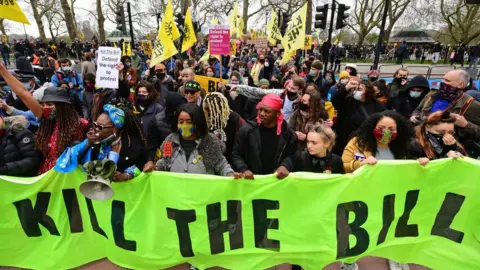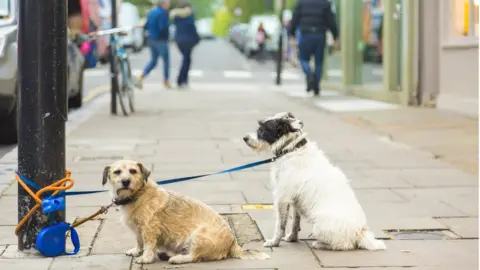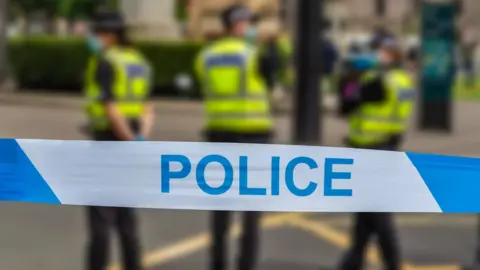Ministers see off MPs' attempts to amend new crime bill
 PA Media
PA MediaThe government has seen off attempts to scrap controversial curbs on protests and other changes to new public order laws going through parliament.
MPs approved the Police, Crime, Sentencing and Courts Bill on Monday evening by 365 votes to 265.
Dozens of amendments had been proposed but the Commons did not approve any of them.
But ministers said they will look to strengthen the law on pet theft and violence against shop workers.
The government will also examine whether harassment should be a separate offence.
The Bill will now go to the House of Lords - where there are no time-limits on scrutinising legislation - and where peers could try to insert changes before the legislations returns again to the Commons.
The proposed laws were first debated by MPs just days after a vigil was held for Sarah Everard, amid concerns over the way the event had been policed.
And so-called Kill the Bill protests were held in cities across the UK by campaigners who believe proposed curbs to protest go against individual human rights.
The government says the legislation delivers on its commitment "to crack down on crime and build safer communities".
So what were the arguments and where could changes yet be made?
Protests
The government rejected changes to controversial proposals to introduce conditions on protests.
Ministers want controls on demonstrations that are noisy enough to cause "intimidation or harassment" or "serious unease, alarm or distress to bystanders".
That includes protests consisting of one person. The bill also proposes restricting any activities around Parliament to a "controlled area".
Veteran Labour MP Harriet Harman wanted the Bill to define "an express statutory right to protest", with new obligations on public authorities, while also recognising that there should be some limits on the right to protest to protect other legitimate public interests.
Labour's shadow Home Office minister Sarah Jones said the Bill "went too far" in reforming public order legislation.
"The point of protest is to capture attention, protests are noisy, sometimes they are annoying, but they are as fundamental to our democracy as our Parliament", she added.
Home Office minister Victoria Atkins said: "The Bill does not stop the freedom to demonstrate. It balances that freedom against the rights and liberties of others."
Tackling sexual violence
Ms Harman, who chairs the Commons Human Rights Select Committee, also proposed new offences of harassment in a public place and kerb-crawling which amounts to harassment.
Her proposals were defeated but Ms Atkins told MPs the government was "continuing to examine the case for whether there should be a bespoke offence" on street harassment.
The government also signalled that it is considering extending the time limit for prosecutions for common assault in domestic abuse cases amid concerns that many are being "timed out" because of delays in the justice system.
And ministers have agreed to review a loophole in the current law that allows sex offenders to change their name.
But other changes that were defeated include:
- proposals for criminal blame to be shifted to the person who buys a sexual service, and away from anyone who offers it;
- changes to the handling of sexual allegations, so that rape victims do not have to give evidence on their past sexual history, and specialist for training judges.
- creation of a minimum sentence for rape of seven years, unless there are exceptional circumstances which justify not doing so.
Pet theft
 Getty Images
Getty ImagesIt is estimated that dog thefts have risen by 250% since the coronavirus pandemic began.
Former Conservative leader Sir Iain Duncan Smith proposed changes to toughen the law against the theft of a pet.
Government minister, Lord Chancellor, Robert Buckland said the government intends to make changes to the Bill in the Lords and the effect "will help to achieve what he is seeking".
Under Sir Iain's plans, cash sales for animals would be banned; there would be a legal requirement on vets to scan a dog's microchip to check if it is stolen and the offence of pet theft would be made a specific category of crime, meaning much higher fines and tougher sentences.
Attacks on shop workers
Home Office minister, Victoria Atkins said the government is "actively considering" new laws to protect shop workers from violence and would introduce these "if appropriate" at the next stage of the bill in the Lords.
MPs had proposed a new crime against attacks on shop workers that would have created a new offence and a 12-month prison sentence for abuse, threats, and violence against retail workers.
Retail bosses have called on the prime minister to take action against violence and abuse aimed at shop staff.
Failure to stop
Labour MP for Exeter Ben Bradshaw wanted to create a new offence for failing to stop or report an accident where the driver knew there had been a serious or fatal injury - with a maximum sentence of 14 years.
He also wanted drivers who commit repeat offences, such as using mobile phones at the wheel, to be disqualified, rather than being able to plea "exceptional hardship" to keep their licence.
He urged the government to adopt the proposals in the Lords.
He said the families of victims felt the penalties for road traffic offences "do not fit the crimes" and that while ministers had been promising reform since 2014, "that has yet to happen".
Justice Secretary, Robert Buckland, said he took the points "on board".
He added: "We have the common law offence of perverting the course of justice available, more work needs to be done to identify that class of driver who manipulates the system and evades responsibility in a way that clearly outrages the community and offends the wider public."
Abortion reforms
Proposals were rejected to introduce buffer zones around abortion clinics to stop intimidation or harassment of women accessing clinics, or people providing abortion services.
Labour's Rupa Huq had previously tried to introduce specific legislation to ban demonstrations outside clinics. She said women should not "be met by lifelike medically inaccurate foetus dolls and graphic images, or handed misleading literature".
During Monday's debate MPs said the proposals go against the right to protest - even if such protest could be considered offensive, and that current laws against harassment could already be applied. But peers could try to bring the amendment back in the Lords.
In 2018, the BBC reported from Ms Huq's west London constituency where anti-abortion campaigners stood outside a clinic urging women to change their mind.
What else does the legislation say?
 Getty Images
Getty ImagesOther proposals in the bill - which stretches to 300 pages - include:
- Changing sentencing rules so that serious criminals spend more time in jail before they can be conditionally released
- Judges will be allowed to consider jailing child murderers for their entire lives
- Maximum sentences for low-level assaults against emergency service workers doubled to two years
- On terrorism, the bill creates powers to more closely monitor offenders released from prison
- Community sentences for less serious crime to address underlying problems in offenders' lives
- Changes to sexual offences law to tackle abusive adults in positions of trust, such as sports coaches and religious figures
